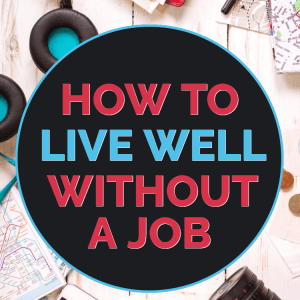Contents

For example once you learn how to live within (or below) your means you can immediately forget about getting into debt, you can start paying off any existing debt and you can start putting money aside for the future.
Of course, if you’re struggling with finances right now that’s all easier said than done.
You already know that living below your means makes sense; you just need to know how to do it. Fortunately, that’s exactly what we’re going to talk about today.
Benefits of Living Below Your Means
Before we actually start discussing a simple, workable plan for living below your means I think it makes sense to discuss some of the most important benefits of such a lifestyle.
You see, while learning how to live below your means takes a little effort at first (and may initially be a little uncomfortable), as you’re going to find there are just so many benefits that you’ll wonder why everyone doesn’t start living like this.
Even better, when you have a full appreciation of why you should live beneath your means, you’ll be that much more motivated to take action and change your financial future for good.
Debt Elimination (and Avoidance)
Struggling to pay off debt? There is an easier way…
The way to get into debt is pretty simple; when you spend more than you earn, you’ll need to make up the shortfall by borrowing from friends, family or the bank. That’s never a pleasant experience.
The problem with getting into debt to pay basic living expenses is that the debt needs to be paid back – with interest.
What this means is that if you’re already struggling to make ends meet financially, taking on debt to meet your requirements is actually going to make your financial situation worse.
Why? Quite simply because when you take on debt, you’re actually adding another expense – debt repayment – and putting it on a list you’re already struggling to meet.
Living below your means instantly brings your spending under control, ensuring that you’re not going over your budget each month. As a result, living below your means not only helps you to avoid getting into any more debt, but can also help provide funds to repay any debt you already have.
Saving For the Future
Where would you like to be in 5 years time? What about 10?
What will your house look like? What about your garden? What car will you drive and what vacations will you take? While it’s not fashionable to admit it, money has a major impact on these decisions.
After all, if you’d like to buy a new home, but you’re unable to save a deposit for a house, it’s unlikely you’re going to be moving any time soon.
Learning to live within your means ensures that you control your spending – and make your money work for you. Putting just a tiny amount away each month can soon add up and make your future look far more enticing.
Less Financial Stress
Only a few years ago I used to dread those brown envelopes that came through my door with worrying regularity. Every time I got home from work my heart would sink if one was sitting on the doormat waiting for me.
In truth, they often lay unopened for weeks a time. I couldn’t afford to pay them until the end of the month, so why worry?
Except I did worry. I lay awake at night, wondering how I was going to keep afloat.
Worse, I worried if I’d get another bill before payday. There’s very little that’s more depressing than spending most of your paycheck servicing last months bills, ending up close to broke within days of getting paid.
Living below your means largely eliminates this worry. Not only do you have a little “spare money” put aside each month to help with life’s emergencies, but you’ll also have carefully planned for bills. You’ll know (roughly) what’s coming and will be ready for it.
No surprises. No stress.
Fewer Financial Emergencies
When you live at or above your means any unexpected bill is a major headache.
What if your car suddenly needs $500 of work doing, like TODAY?
If you’re living above your means it’s going to mean more stress, more worry and – potentially – more debt.
Living below your means is different. Those savings you started to collect? They’re the answer to life’s little emergencies – hence many people talking about an “emergency fund”.
Quite simply saving up the equivalent of 3-6 months worth of expenses, in an easily-accessible account, helps to eliminate most financial emergencies.
Those surprise car repairs, or washing machine replacements, or the drop in hours at work simply don’t have the same impact that they do when you’re spending more than you earn.
Satisfaction in Achievement
Living below your means isn’t always easy – I know that.
It takes time, effort and more than a little sacrifice. In many ways it’s easier (in the short term) to just maintain your current lifestyle and simply pop things on the credit card when necessary. But you know as well as I do that such a lifestyle can’t go on indefinitely.
Sometime soon you’re going to have to change how things are done – and the sooner you make the change the less painful it will be.
Actually transitioning from living above your means, through to living below your means, is tough yet do-able. What’s more, its downright satisfying.
Finally deciding to take control of your money and make it work for you, rather than feeling like you’re a slave to your financial situation, is an incredibly empowering experience. When it happened to me I felt about 6″ taller for weeks, simply because I’d taken control and won.
Less Worry Over Work
Let me tell you a little story about an old work colleague of mine. He earned a decent salary and worked hard for it. Outside of work he intended to enjoy his money.
He bought himself a nice house – taking out the biggest mortgage the bank would give him. He loved the house, but the repayments started to wear him down.
Quite simply there wasn’t enough “slack” in his budget.
Then, the company we worked for started to change.
The workload increased. Our relaxed line manager got replaced by someone trained by Satan himself. Our staff budget got cut. Every month it seemed like we were expected to do more and more work, with fewer and fewer people.
It reached breaking point and I left for pastures new. But not my colleague. He couldn’t afford to go anywhere else – he’d been there so long that no other position would pay him even a fraction of what he as earning.
He’s still there. Years later. Financially trapped. In a job he hates.
And all because he’s living too close to his means.
Living below your means helps to eliminate worry over your work. When you have some slack in your budget, when you have some money put aside, suddenly needing to change jobs, or reduce the hours you work isn’t such an issue. Living below your means is freedom from the man.
Better Family Time
It’s no secret that financial stress is one of the biggest causes of arguments between couples. For people living above their means, and struggling to make ends meet, it follows that some of this stress is likely to bubble over – either into your relationship with your significant other – or even onto your kids.
Nobody wants that – but sometimes it happens.
You get home after a hard day at work, worrying how you’re going to pay a certain bill, only to find another waiting for you. Under such circumstances you’re probably not in your best frame of mind for “family time”.
Eliminate that stress, though, and you’re free to spend quality time with your family. To live in the moment. And perhaps to even spend a little money going without guilt, knowing that you’ve carefully budgeted for it.
Planning for the Future
Living below your means and starting to build up some savings doesn’t just help to remove short-term financial emergencies, it also means you can start to plan seriously for the future. In other words rather than always living close to the line, you can start very realistically to start plotting and planning for the future.
“Fun Money”
When you’re struggling to make ends meet its difficult to spend money on anything other than essentials without feeling guilty. After all, how do you rationalize buying a new bag, or visiting that new restaurant, if you’re struggling to pay for gas?
When you’re living below your means you’re spending money consciously. You have a plan in order to make sure you don’t overspend. And part of that plan can entail “fun money”.
At last you can fritter away a few dollars here and there enjoying yourself and not worry about whether or not you’ll make it to payday this month.
Greater Options
While money won’t necessarily buy you happiness, it does buy you choices.
People with no debt, people with savings; these people have far more options in life. They don’t have to say “no” to things all the time. They don’t have to buy the cheapest of everything. And they can live in a nice house, in a nice area.
But all this happens after you’ve gained control of your finances. And as we’ve already said living below your means is the cornerstone of achieving that goal.
So spend less than you earn, start putting some money aside, and soon enough you’ll find all sorts of possibilities start opening up for you which didn’t exist before.
How to Live Below Your Means
If you’re convinced that living below your means makes sense, but you don’t know where to start then there are some simple but very effective ways to achieve this.
Understand Your Income
The first stage in living below your means is getting a handle on your income. If you get paid the same amount on a regular basis then this should be a reasonably simple process. If you get paid varying amounts, or receive these funds irregularly, then you might have to do a little digging.
Your aim should be to look back over your last few bank statements or pay slips and deduce how much you earn on a monthly basis.
This then becomes your baseline. The goal is to not only not go over this, but also to try and stay as far under it as is realistic.
Track Your Historical Spending
Once you know how much money is coming in each month, the next step is to calculate just how much is going out. From here we can see just how big the difference between these two numbers is, and whether you’re on the right side or the wrong side of your target.
There are a number of ways to do this, but arguably the simplest (if most long-winded) is to grab the last three months of bank statements and start digging through them. Aim to categorize your purchases into neat groups – such as grocery shopping, eating out, rent/mortgage, utility bills and so on.
Going through three months or more might take time initially but there are two reasons why you should examine your spending over a number of months:
1) Irregular Bills
Not all spending occurs regularly. While you might pay your rent every two weeks or every month, utility bills are an example of an expense that are often sent quarterly.
2) Better Averages
The longer the period of time that you analyze, the more accurate your results will be because the averages will reduce outliers. For example if you just had a cold spell of weather where you had the heating on 24/7 its unlikely that bill will be reflected the next month when spring comes round. By analayzing three months or more you’ll be able to get a better “feel” for exactly where your money is going.
Eliminate
By now you’ll have a fair idea of your incoming and outgoing money on a monthly basis. How do the figures make you feel? Is there a lot of work to be done, or are things pleasingly close?
Whatever the case, if you’re reading an article about living below your means its likely that you’re going to need to cut some expenses.
There are two main ways to do this, but for the purposes of this article we’ll start with “elimination”.
The process is exactly as it sounds; you look at all that money you’ve been spending and see what you can stop spending in the future.
- Have you discovered that you’re wasting a ton of money on eating out, cigarettes or posh coffee? If so, could you eliminate this expense?
- Are you paying for TV services, monthly subscriptions or software packages that you rarely, if ever, use? If so, consider cancelling these.
- What about memberships to clubs, associations, gyms and the like?
Be ruthless – go through your spending until you’ve chopped as many unnecessary expenses as possible. You’ll often be surprised by just how much “extra” money you have each month when you look at your expenses in such detail.
Economize
Once you’ve cut everything you feel you can, the next step is to economize on what’s left. In other words, to find ways to save money on everything you do spend.
Some of these are easier than others to implement. Easy wins could be swapping branded food items for own-brand versions, growing some of your own vegetables, trying to negotiate a better utilities tariff or downgrading your cell phone plan.
Remember: every single dollar counts here so challenge every part of your budget. Your goal should be to find ways to reduce every single category on your list.
Between elimination and economy, your goal is to take your average predicted spending below your level of income. When you achieve this, you’ll be successfully living below your means.
Track Your Future Spending
By now you’ve got a plan. You know your target figures and you’ve decided on a way to achieve them. All you really need to do now is to make sure you keep to your budget.
That means that you’re going to need to track your future spending. The easiest way I have found to do this is with a tool like Personal Capital, the free budgeting and spending tracker.
Rather than having to sit around with a pen, notebook and calculator each month to see how you’re doing you can then simply log into your free account and see in a moment how you’re doing with your targets.
Review Regularly
I have an admission to make; no first attempt at a budget is ever perfect. In fact, creating a spending plan is a lot harder than you might realize – which is why I recommend Personal Capital to help. However even then you’re going to find that there are ways your budget can be improved.
Over time you’ll probably find that you keep overspending on a certain category, yet other expenses can easily be cut. When I first started budgeting I would review my spending each month and pretty much every month I’d find some other expense I could reduce or eliminate altogether.
Over time, all these little cuts really add up, making it ever easier for you to live below your means.
Bonus Tip: Increase Your Earnings
As a final bonus tip, one of the best effective ways to live well below your means and really start to build up those savings is by increasing your income in any way possible. Put some effort into figuring out ways in which you might earn more and you’ll find it easier than ever before to live within your means.
What are your top tips for living below your means? What have you struggled most with when trying to reduce your expenses? Please leave your thoughts in the comments section below…











After 50+ yrs and the death of my husband I have finally learned this lesson. What a stress reliever. Your information is great and I also will be using some of your tips I didn’t think of.
Thanks Ramona
Back in 1990, it was obvious the U.S. was gearing up for a housing crisis when my husband and I applied for pre-approval for a mortgage. Our credit union was willing to loan us almost TWICE what we planned to borrow. I told the loan officer I wasn’t sure I wanted to do business with a financial institution that goofy. In the end we bought a comfortable 2400 square foot home in a nice Denver suburb, not the mini-mansion the credit union had us lined up for. We both retired with a paid up mortgage in 2010, unlike the debt load we’d still have hanging around our necks today.
The biggest thing for me and my family was to find housing we could actually afford. It was the single biggest game-changer that allowed us to start to live below our means.
Very true. Housing is such a big expense Nicole – I completely agree with you that slaying that beast can offer a lot of freedom when it comes to living below your means.
Excellent article!
Great post, actually conveys the feeling of financial power/strength. Yes, emergencies are FAR less stressful when you have the means to pay/hire the problem away if necessary. You nailed it, work is much better when you are in financial control…especially if you have FU money. Great structure here. If only millions of people learn part of this logic.
[…] key to becoming financially free is that you need to live beneath your means for the rest of your life. You need to fully master this one before you can get to where you want […]
[…] If you’re not familiar with the term “live below your means”, it simply means to spend less money than you actually make. It means if you are making $50,000 a year, you should be spending money like you are making $40,000 or perhaps $30,000 per year. This is living below your means, and this is what will help you save a lot of money and help you get out of debt. You may have a great job paying you great money, but if debts are really high, you can’t pretend to live like you are rich. You need to dial back your spending and pretend you make way less money, drive a way cheaper car, and get your money issues handled before you can start spending money that matches your income again. To help you with that, here is a beginners guid on how to live well below your means. […]
Excellent tips. I have used several of your suggestings over the past few years. The best tip I’ve been using is to “pay yourself first” and not look at income tax refunds as “free money” to splurge with. In 36 months I saved $3,500 just be not spending my federal income-tax refund check. It has given me a piece of mind that allows me to have the most restful sleep in my adult life!
[…] as a surprise – to sum it up neatly you could say you should Live Below Your Means – LBYM. So the two sides of the equation are Income and Expenditure. For those who are seeking FI, the […]
thanks for the shout out!
Glad you enjoyed reading this article.
No problem.
Great article – interesting, informative with the gan angle.
What excellent advice,although am doing well,I read everything that has to do with money ,that keeps me motivated,and on top of anything that
Could be new to me.
My number one advice is STOP SPENDING stay away from people or things that trigger you to spend,you are the driver,so you decide when where and how.
Good advice but I have a slightly different perspective. Of course it took me and my husband a few years but we are definitely living a rightsized life at this point. Here’s a few things we did https://www.smartliving365.com/ten-smart-frugal-ways-save-money-enjoy-peace-mind/
[…] is to always live like you are in debt even when you aren’t. Make the commitment as a family to live below your means in order to invest money for the […]
Driving an older car is a feather in your cap! DIY is an excellent hobby, those folks that complain about it simply can’t & try to make you feel bad for saving $$$ and fixing it yourself! I love crying all the way to the bank.
[…] petrol, cars, food, clothing etc…But it’s not all doom and gloom, especially if you’ve been living beneath your means and have some financial resilience, and here’s […]